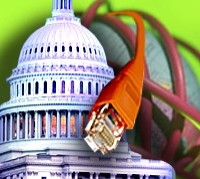By Warner Todd Huston ——Bio and Archives--September 30, 2010
American Politics, News | CFP Comments | Reader Friendly | Subscribe | Email Us
 In an address to the United Nations on Thursday, Sept. 23, President Obama pledged to preserve a “free and open Internet” and would call out nations that censored content.
In a veiled reference to China and other nations that censor the Internet, Obama said that a civil society fosters open government. “Civil society is the conscience of our communities, and America will always extend our engagement abroad with citizens beyond the halls of government. And we will call out those who suppress ideas and serve as a voice for those who are voiceless.”
In an address to the United Nations on Thursday, Sept. 23, President Obama pledged to preserve a “free and open Internet” and would call out nations that censored content.
In a veiled reference to China and other nations that censor the Internet, Obama said that a civil society fosters open government. “Civil society is the conscience of our communities, and America will always extend our engagement abroad with citizens beyond the halls of government. And we will call out those who suppress ideas and serve as a voice for those who are voiceless.”“We will promote new tools of communication so people are empowered to connect with one another and, in repressive societies, to do so with security,” Obama said. “We will support a free and open Internet, so individuals have the information to make up their own minds. And it is time to embrace and effectively monitor norms that advance the rights of civil society and guarantee its expansion within and across borders.”Yet even as Obama stood giving high sounding words to a “free and open Internet” and scolding other nations that have oppressive controls on Internet access for their own citizens, Barack Obama's own government has itself been quietly making plans to take over the Internet from private companies. Obama's Federal Communications Commission Chairman, Julius Genachowski, has been angling to use telephone regulations from the 1930s to try and take over full control of the Internet. One wonders how Obama can have the gall to claim that he wants a “free and open” Internet when he is trying to take control of it himself? How long would the Internet stay “free and open” once the federal government takes hold of it and begins to decide what will be allowed and not allowed over it's infrastructure? As always, Barack Obama talks out of both sides of his mouth claiming all at once that he is for open access, and promoting new technologies and businesses while at the same time making plans for Bi Government to control it all from Washington. Henry Waxman (D, CA), Chairman of the House Energy and Commerce Committee, also seems to be very confused about what is going on with the idea of the FCC grabbing control over the Internet. On one day this week he wanted to introduce legislation that would put Congress in the driver’s seat on regulation thereby cutting out the FCC from regulating the Internet, but then the very next day he reversed himself 100% and decided it wouldn’t be a good idea. It is a bit hard to understand such a whiplash-inducing move but it has happened nonetheless. Still, if Congress takes up a consideration of how to handle the Internet this should forestall the FCC’s attempts to forcibly take over the Internet via fiat regulation. Anyone interested in keeping the government’s hands off the full control of the Internet should pressure Waxman to take up his original position. Others that can put off the FCC’s power grab are Marsha Blackburn (R, TN) — who has come out in opposition to government control of the Internet — and Rep. Rick Boucher (D, VA), another member of Energy and Commerce Committee. A good mode of pressure is to cite a new poll that says that the public is not in favor of the government take over of the Internet. BroadbandforAmerica.com has an interesting report about a survey made by Hart Research Associates that seems to indicate that there is “substantial opposition to government Internet regulation.” The survey shows that 75 percent oppose government regulation with 55 percent saying that government should not regulate the Internet at all. In other words, respondents did not want the government saying how business should be conducted on the Internet and were reticent to agree that government should restrict or control Internet providers. Congress should be made aware of these fact.
View Comments
Warner Todd Huston’s thoughtful commentary, sometimes irreverent often historically based, is featured on many websites such as Breitbart.com, among many, many others. He has also written for several history magazines, has appeared on numerous TV and radio shows.
He is also the owner and operator of Publius’ Forum.